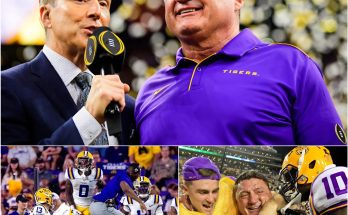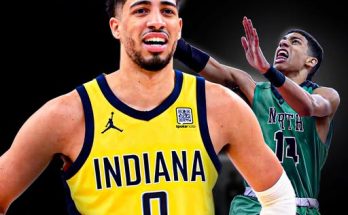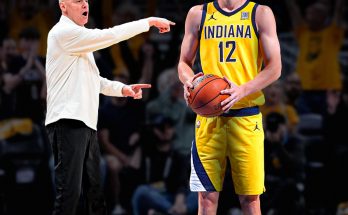Alabama Basketball Icon Robert Horry Returns to Crimson Tide Program, Reunites With Former Teammates and Coaches.
Robert Horry, a name etched into both collegiate and NBA history, is making a celebrated return to his alma mater, the University of Alabama. In a move that has electrified Crimson Tide fans and stirred up memories of Alabama’s basketball golden years, Horry is reuniting with the program that helped launch his legendary career. With this homecoming, Horry not only reconnects with his roots but also brings decades of basketball knowledge, championship pedigree, and a vision for elevating the program to new heights.
Known affectionately as “Big Shot Rob” for his uncanny knack for hitting clutch shots during the NBA playoffs, Horry is a seven-time NBA champion who carved out a unique legacy with the Houston Rockets, Los Angeles Lakers, and San Antonio Spurs. Before that, however, he was a cornerstone of the Alabama Crimson Tide basketball program under head coach Wimp Sanderson in the late 1980s and early 1990s. Alongside teammates like Latrell Sprewell and James “Hollywood” Robinson, Horry helped Alabama dominate the SEC and become a mainstay in the NCAA Tournament.
Now, over three decades after donning the crimson and white, Horry is stepping back onto the Tuscaloosa hardwood—not as a player, but as an influential figure committed to the program’s growth. While his exact role will span multiple responsibilities, including mentoring players, supporting coaching staff, and aiding in recruiting and alumni relations, the overarching goal is clear: to restore Alabama basketball to national prominence.
This reunion between Horry and Alabama is deeply personal. Born in Harford County, Maryland, and raised in Andalusia, Alabama, Horry became a hometown hero by choosing to stay in-state for college. As a freshman in 1988, he immediately made an impact with his shot-blocking and versatility, showcasing the athleticism and basketball IQ that would later define his professional career. He played under Coach Sanderson from 1988 to 1992, helping Alabama secure three SEC Tournament titles and four consecutive NCAA Tournament appearances.
Throughout his college career, Horry was a defensive juggernaut and a reliable offensive threat. He still ranks among the school’s all-time leaders in blocked shots and is remembered for his ability to impact games in multiple ways. Horry’s combination of size, shooting touch, and basketball instincts made him an ideal forward in both college and the NBA, where he seamlessly transitioned into a role player with championship-level impact.
Horry’s return to Alabama signals more than nostalgia; it reflects the university’s strategic investment in its basketball heritage and future. The Crimson Tide have experienced a basketball renaissance in recent years under head coach Nate Oats. With up-tempo offense, elite recruiting, and a string of NCAA Tournament appearances—including a deep run to the Elite Eight—Alabama basketball is back in the national spotlight. Horry’s presence further strengthens this momentum, offering players a direct link to greatness and a reminder of what’s possible at Alabama.
More than just a symbolic addition, Horry’s return brings tangible benefits. He is expected to play a critical role in mentoring Alabama’s young talent. In today’s college basketball landscape—dominated by one-and-done players and the transfer portal—having someone with Horry’s experience and insight can be transformative. His understanding of the game, particularly in pressure moments, could help players develop the mental toughness needed to thrive in March Madness and beyond.
His presence is also a massive recruiting advantage. In a sport where high school prospects often dream of making it to the NBA, few programs can now offer them the opportunity to be mentored by someone who’s been there, done that, and won seven rings along the way. Horry’s success story is a compelling testament to what can be achieved through the Alabama pipeline. His championship experience with legends like Hakeem Olajuwon, Shaquille O’Neal, Kobe Bryant, and Tim Duncan gives him unmatched credibility when speaking to recruits about what it takes to win at the highest level.
Furthermore, Horry’s return strengthens the ties between Alabama’s current basketball identity and its historic roots. By reconnecting with former teammates and coaches, Horry bridges the gap between generations of Crimson Tide basketball. His involvement ensures that the legacy of Wimp Sanderson’s era—defined by tough defense, consistent NCAA bids, and a passionate fan base—is not forgotten but used as a foundation for the future.
In recent interviews, Horry has expressed his excitement about being back in Tuscaloosa. “Alabama gave me everything,” he stated. “This program shaped me into the player I became and gave me the platform to chase my NBA dreams. Now I want to give back—to the school, the players, and the fans.” His humility and commitment resonate deeply with the Crimson Tide faithful, who remember his pivotal moments and now look forward to his impact off the court.
His return has already sparked enthusiasm among former players and coaches. Wimp Sanderson, now in his 80s, called Horry’s decision “one of the best things that could happen to Alabama basketball,” noting how invaluable his leadership and example will be to current players. Latrell Sprewell, Horry’s former teammate and fellow NBA veteran, also expressed pride and support. “Rob always had that leadership in him,” Sprewell said. “He knew how to win, and he knew how to make others better. Alabama’s lucky to have him back.”
Within the athletic department, administrators view Horry’s return as part of a broader strategy to harness the influence of former stars to elevate the program’s national profile. Athletic Director Greg Byrne noted that reconnecting with alumni is a cornerstone of the department’s approach, and few alums embody Alabama’s basketball tradition like Horry. “He represents excellence, both in college and the NBA,” Byrne said. “Bringing him back home enhances everything we’re building.”
From a cultural standpoint, Horry’s return is also a celebration of Alabama’s growing basketball identity in a state traditionally dominated by football. While Crimson Tide football commands global attention, basketball is becoming a more prominent force on campus and beyond. With Horry’s help, the program is poised to continue this upward trajectory, challenging SEC powerhouses and competing for Final Four berths.
On a broader scale, Horry’s involvement underscores a national trend of college programs embracing former stars to boost morale, development, and visibility. Programs like Michigan, with Juwan Howard, and Memphis, with Penny Hardaway, have demonstrated how powerful such connections can be. While Horry isn’t taking on a head coaching role, his position within Alabama’s infrastructure will carry significant influence and visibility.
Beyond the court, Horry’s return opens doors for community engagement and alumni events. Plans are already in motion for charity initiatives, basketball clinics, and youth outreach programs under his guidance. His charisma, humility, and championship résumé make him a perfect ambassador for the university. Whether speaking to students, donors, or media, Horry embodies the values Alabama holds dear—resilience, excellence, and loyalty.
As the upcoming college basketball season approaches, fans are buzzing with anticipation. The prospect of seeing Robert Horry courtside at Coleman Coliseum, interacting with players, engaging with the crowd, and supporting Coach Oats, is invigorating. It adds a layer of gravitas to an already promising program. And while Horry’s on-court days are behind him, his influence could prove just as game-changing now as it was when he patrolled the paint in the early ‘90s.
In many ways, Horry’s return completes a full-circle journey. From a lanky forward trying to prove himself in Tuscaloosa to a seven-time NBA champion, and now a mentor and leader back where it all began, Horry’s story is emblematic of everything college sports can offer. It’s a reminder that greatness doesn’t just happen in the pros—it’s often born in college gyms, shaped by coaches and teammates, and ultimately refined by experience.
For the Alabama Crimson Tide, having Robert Horry back is more than just a boost—it’s a homecoming of a legend, a recommitment to tradition, and a bold step toward future glory.



